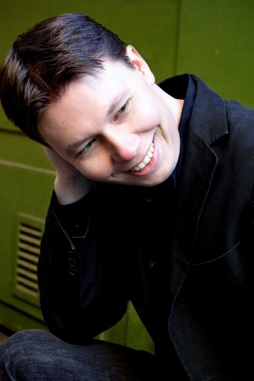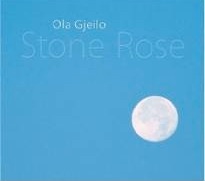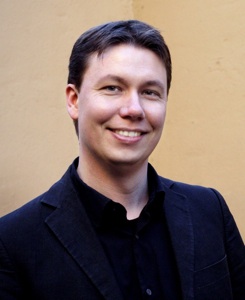I first heard the music of Ola Gjeilo (pronounced Yay-lo) in September 2008 when I was making the long drive from the central Oregon Coast to the SF Bay Area. His Stone Rose CD had come in for review, and I listened to it over and over as I drove. Michael Debbage had told me before the trip that CDs like this one were the reason he had become a reviewer - no small praise! Gjeilo’s flawless technique, soulful compositions, and elegant playing style are mesmerizing to the point that both Mike and I listed Stone Rose as one of the best CDs of the decade. This seems like a great time to get to know this composer a little better and to hopefully introduce his music to a bigger audience.
Ola Gjeilo was born in Norway in 1978 and grew up there. After studying for his Bachelor’s Degree at the Norwegian Academy of Music in Oslo and the Royal College of Music in London, Ola moved to the US in 2001 to study at Juilliard. He completed his Master’s Degree in composition there in 2006. Since then, he has composed music for solo piano, various instrumental ensembles and orchestras, choral and vocal music, and art songs. He has very impressive list of commissions from all over the world already, so he is certainly a young composer to keep our eyes on!
KP: Both Michael Debbage and I listed your Stone Rose CD as one of the best of the decade. It literally took my breath away. Are you planning to follow it up with a new CD soon?
OG: Well, thank you very much! I'm so thrilled to that you liked Stone Rose. It means a lot to me to hear that, especially from you guys. I want to release a follow-up CD within two years. It will probably be a mix of shorter pieces and some longer, fully improvised pieces, which is something I love to do in concerts.
KP: It’s amazing the variety of music you are composing - piano, orchestral, choral, chamber. Is there a type of music that you particularly enjoy composing?
OG: The main three are orchestral, vocal, and of course piano. I've decided to include the piano as much as I can in whatever I write - it just always seems to make me feel so inspired. I guess the piano is such a huge part of me that I want to show my love for it in everything I write. I think my ideal ensemble is a combination of the three; music for choir/soloists, orchestra and piano. The colors and possibilities are endless! You can really explore the wonderful effects you get by alternating between the intimate and the massive and powerful.
KP: Do you play instruments besides the piano?
OG: Not really, although I'm a decent organ player. My main interest outside of the piano is the synthesizer. I grew up on a good old Yamaha SY77, and have always loved working with electronics, with an emphasis on atmospheric and warm pads. When I was younger, I was influenced by Vangelis, Mike Oldfield, Jan Garbarek, and a lot of film composers like Gabriel Yared, etc., who really understood how to make electronics sound good and beautiful. Vangelis' score for 1492 is a classic!
KP: It seems that Vangelis has had a strong influence on many contemporary composers. When did you start playing the piano?
OG: I'm not quite sure, to be honest. I think I started as soon as I could physically play. Maybe 3 or 4?
KP: When did you start taking piano lessons?
OG: I started taking lessons when I was 7 and wore out a number of teachers along the way. I think I just wanted to work on my own stuff and loved improvising. I had a good ear and could play music I heard very easily, so it wasn't imperative for me to learn to read music right away. Eventually I got around to it, and I had a wonderful piano teacher before and throughout junior high who really taught me how to play with proper weight and no flimsy fingers. I owe her a lot. I never became very diligent when it comes to practicing classical piano, although I enjoy the music of Bach, Mozart, Chopin and all the others. I guess I just love improvisation too much.
KP: I don’t really think you can love something like that too much! When did you start composing?
OG: I'm not sure, but I think I started very early. This was mainly through improvisation, which would eventually turn into real pieces as I matured.
KP: Did your piano teachers encourage you to improvise or compose?
OG: Mostly, yes, in a kind of passive way. It wasn't really their field, and they didn't know much about improvisation, so I think it made them a little uncomfortable. The main thing is that nobody told me not to.
KP: That’s a very important point - not being told not to improvise. My own teacher more or less forbade it, and that really affected my playing.
OG: I was too stubborn anyway. Even in college, I really didn't do much of what my teachers wanted me to do. I think that if your heart tells you to go somewhere, it's really important to follow that intuition, no matter what anyone says!
KP: I couldn’t agree more!
OG: I loved my experience at Juilliard, but it was more about being in that wonderful environment than the actual curriculum for me. Fortunately, I had a synthesizer teacher for a while when I was younger who really understood where I was coming from, and later a classical composition teacher who taught me a lot both musically and philosophically.
KP: When did you know that you were going to have a career in music?
OG: I think I always knew I wanted to be a composer and pianist. The only other thing I ever considered was soccer, but I realized I wanted to do something that had a more lasting impact. Besides, as much as I love sports, my heart was always in music.
KP: How is musical training different in Norway than it is in the US?
OG: That's a good question! I didn't grow up here in the US, so I don't know much about the education system below college level. It's hard to compare since Norway is so tiny (only about 5 million people) and the US is so huge, but I love how big the choral and wind band culture is here, both on the high school and college level. As far as I know, we don't have quite as much of that in Norwegian schools. I just loved being in college here because Americans are generally so enthusiastic and open to new things.
KP: When did you come to the US? Did you emigrate to study at Juilliard?
OG: Yes, I came here to study at Juilliard in 2001. Aside from two years in London and one year in LA, I've lived in New York since then, and I absolutely love it. New York, LA and the US in general really feel like home to me.
KP: Have you done any film music at this point?
OG: I have done a number of short films, but no feature length movies so far. It's something I would love to be more and more involved in. I knew it would take a bit longer when I moved back to New York from Los Angeles. I like doing concert music so much right now, but when the right movie comes along, I'm there.
KP: What are some of your musical goals?
OG: I want to release a piano album every two years, and I wish to gradually do more and more film work, as I mentioned above.
KP: Who and what do you consider to be your musical influences?
OG: I think my biggest influences are Keith Jarrett, Thomas Newman, Howard Shore, Philip Glass and John Adams. All Americans, incidentally!
KP: Interesting! Was your musical training strictly classical or were you allowed to try jazz, rock, and other genres of music?
OG: My official musical training was strictly classical and jazz. I sort of picked up the other genres on the way.
KP: Who are some of your favorite classical composers?
OG: Of the old composers, I like the Bach-Mozart-Brahms-Strauss lineage. I also have a special love for some of Grieg's music, partly because I grew up with it, being Norwegian, but I really like the immediacy and warmth of his best works. Rachmaninov is another favorite. I tend to listen the most to living American composers such as Keith Jarrett, Philip Glass, John Adams and some Aaron Jay Kernis. Except for Jarrett, my favorites by far are all film composers such as Thomas Newman, John Williams, Dario Marianelli, Howard Shore and Alexandre Desplat (and Philip Glass, of course). These are the great composers of our day, in my opinion!
KP: Is Stone Rose the only recording of your music so far?
OG: It's my first piano CD, but there are quite a few recordings out there of my choral music. The next release I'm personally involved in will be my Sunrise Mass for choir and string orchestra, probably this year. For my next piano album, I would love to work with the Norwegian record company 2L again (who also did Stone Rose). Their stereo and surround sound quality is so amazing, they were just nominated for another Grammy for Best Surround Sound!
KP: What kinds of things do you like to do when you’re not doing music?
OG: I like to hang out with my girlfriend, go to the movies (I'm a huge movie buff) and concerts, and I love following politics for some reason. American politics are so fascinating, probably because what happens here has such a huge impact on the world, while everything in Norway is so much more provincial, although in a very lovable way. And I follow sports very closely!
KP: What has been your most exciting musical experience or moment so far?
OG: The release of my first piano album, Stone Rose, and the premiere of my Sunrise Mass for Choir and String Orchestra in 2008, which was an amazing experience for me. Next time, I want to include the piano as well!
KP: Is there a particular philosophy that you try to convey in your music?
OG: It varies, but I think the common thread through everything I write is that I just want to write something I myself would want to hear. That may sound kind of selfish, but I believe that if I write music that really appeals to me and that I would love to listen to over and over again, chances are that other people will feel that way, too. Hopefully, that way it will be a unique expression of my own musical identity. It sounds obvious, I know, but it's amazing how easily we can trick ourselves into believing that our music should sound like this or that, or that we want to satisfy some external expectations, without really thinking, “Is this something I would absolutely love to listen to? Is this music worth sharing with lots of people? Will it enrich their lives in any way?” It's so easy to forget these very basic questions, and I try to constantly remind myself of them!
Many thanks to Ola Gjeilo for sharing his thoughts with us. For more information about this amazing composer, visit
olagjeilo.com and his
Artist Page here at MainlyPiano.com.
Kathy Parsons
January 2010



